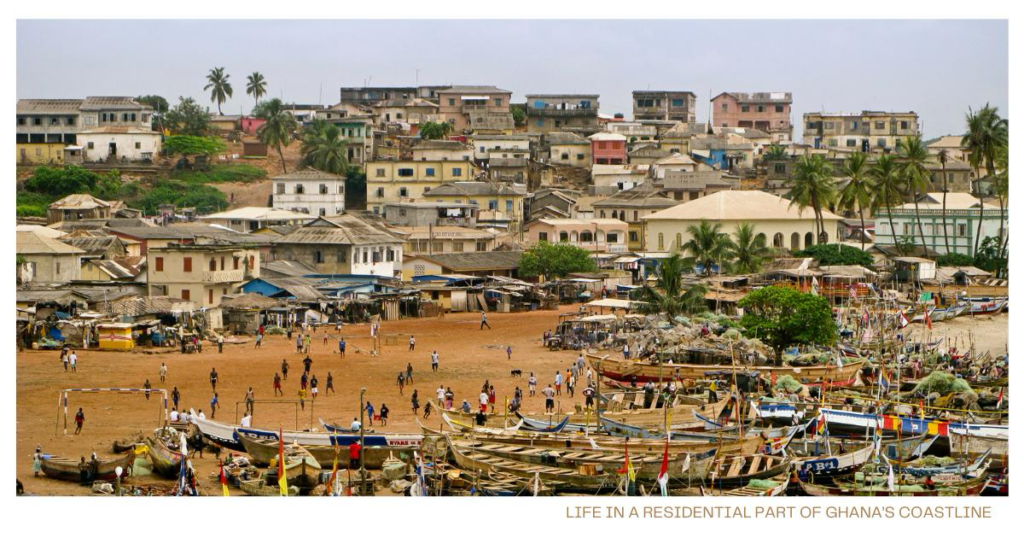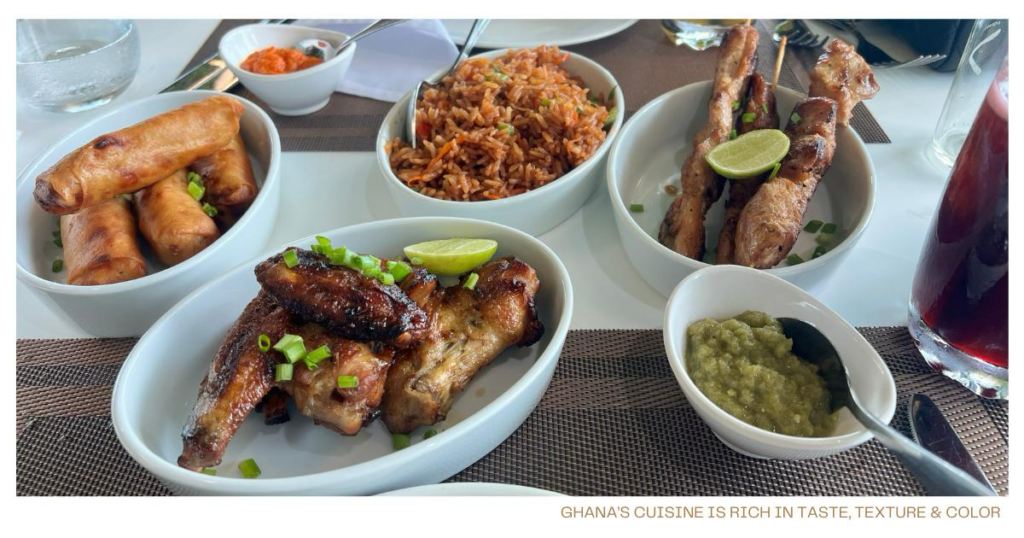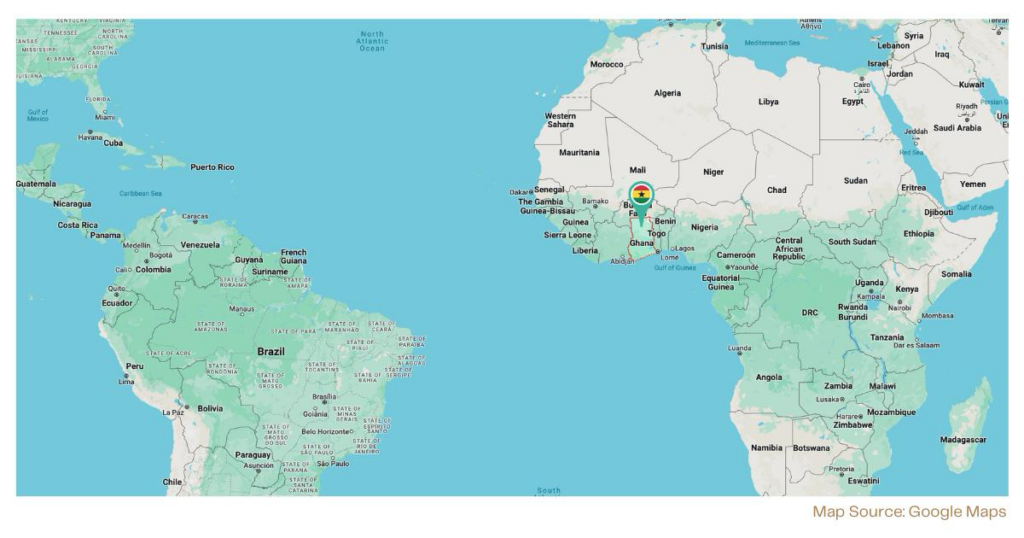Have you heard of Ghana as a destination and wondered how safe it is to visit?
This post answers your questions in detail, looking at different aspects of safety in this West African country and providing recommendations that will help you enjoy a wonderful African adventure securely.
Let’s get to it!
How the African Community Spirit is the basis of safety in Ghana.
Ever heard of “Ubuntu”?
It’s Ghana’s secret sauce – this African philosophy champions community bonds, unity and family as central roles in daily life. Ghanaians are all about that laid-back life and putting relationships and harmony in their social interactions.
It’s no wonder they are known for their friendliness and openness. This philosophy of “we’re all in this together” shapes Ghanaian interactions, fostering a sense of solidarity and support among its people.
While keeping the strong values and kind nature of Ghanaian people in mind, it is still important to use common sense while traveling the country. As with every country, Ghana presents some safety considerations for both locals and visitors.
When exploring this West African gem, four crucial facets of safety stand out: personal safety, safety for women, water and food safety, and transportation safety. Understanding these aspects will allow travelers seeking to engage with this diverse country in a way that will provide them with an exceptional overall experience.
Personal Safety in Ghana: It’s much like the big cities in Europe or the USA
Personal safety in Ghana deserves some attention, particularly in populous cities.
Just as travelers to London, Rome, Paris, Boston or Barcelona need to safeguard their belongings, one should do the same in crowded marketplaces and bustling urban centers in Ghana.
While Ghana ranks higher in safety compared to some of its neighboring countries, incidents of theft and pickpocketing are not uncommon, especially in high-foot-traffic areas. Use common sense and leave expensive jewelry and watches at home. Don’t flash your cash and keep your wallets and purses secure and close to your body.
Should I Fear for my Life in Ghana?
Ghana has strict firearms regulations and carrying firearms in public without valid permits and licenses is illegal and would see serious penalties imposed. Likewise, travelers should not bring firearms into the country.
To give some perspective, it is easier to obtain firearms in the US than it is in Ghana. Given the strict laws prohibiting the possession of unauthorized firearms, the likelihood of life-threatening violent situations is minimal.
Nighttime safety in Ghana: Making the most of the pulsating nightlife!
Generally, the streets of Ghana are safe in the evenings and at night, especially in urban centers and well-populated areas. While no location is entirely free from risks, Ghana is considered comparatively safe for travelers after the sun sets.
The country boasts a vibrant nightlife, with various entertainment options and bustling activities continuing into the evening hours.
Many areas maintain a lively atmosphere and musical beats can be heard on the beaches and the streets of the city. Africans love to dance and the people of Ghana are no exception!
Since Ghanaians are known for their friendly and welcoming nature, it contributes to a sense of security for individuals exploring the streets after dark.
In essence, travelers should have the same safety behaviors in Ghana as they would in any big city in the US or Europe.
Stick to common-sense precautions, such as avoiding isolated or unfamiliar places, remaining in well-lit and populated areas, and refraining from displaying valuable items openly.
Ghana is safe for Female travelers either traveling alone or in a group, but please Respect local Culture
Ghanaian society generally holds a positive regard for women, hence women travelers can feel at ease in many situations. However, in Ghana, as in many parts of the world, women may face specific safety concerns and challenges.
While Ghana is generally considered safe for women travelers, there are certain factors and cultural considerations to bear in mind.The main safety concerns for women in Ghana, as in various other places, is the risk of harassment or unwanted attention. In some instances, women may encounter verbal or non-verbal harassment, especially in crowded areas or public transportation. However, this behavior is not pervasive and does not reflect the majority of interactions.
Understanding and respecting local customs and traditions, including dress codes and behavioral norms, can help women reduce the risk of unwelcome attention.

Christianity and Islam are the two dominant religions in Ghana, with Christianity being the predominant. Keeping that in mind, modest dress is essential to show respect and understanding of local customs and norms.
Clothing should be of lightweight material, after all Ghana has a tropical climate, and should cover shoulders, cleavage, and knees. Tight clothing is generally inappropriate. Loose-fitted clothing is acceptable and more comfortable for the warm environment.
A woman may have to “kick it up a notch” in terms of modesty when visiting religious sites. For these outings, dressing in a culturally sensitive manner by covering the legs, shoulders, arms, and in some cases the head with a scarf, is essential. In Ghana women are generally allowed to enter mosques, but rules can vary at specific mosques.
Again, as you would in any place you are not familiar with, use common sense when it comes to safety. Women should avoid walking alone in poorly lit or isolated areas, especially at night.
Utilizing reputable transportation services, staying in well-known and secure accommodations, and dressing modestly and respectfully according to local customs can contribute to a safe experience.
Food and Water Safety in Ghana
Water and food safety are crucial concerns for anyone visiting Ghana. While the country boasts rich and diverse culinary traditions, travelers must prioritize consuming safe food and potable water.
Opting for reliable drinking sources, like bottled water, is advised, and selecting restaurants or vendors with good hygiene practices significantly reduces foodborne illness risks. Basic hygiene measures such as handwashing before meals further contributes to a safer culinary experience.
If you decide to join our Mind, Body & Soul Tour for July 2024, you will have me and my carefully vetted local travel guides on hand to ensure that you are well advised on safe places to go and things to do. Our entire role is to make sure you have an excellent experience, so please do join us!
When it comes to street food, caution should be exercised regarding meat items. In Ghana, the lack of consistent refrigeration in street food settings may pose a higher risk of meat spoilage or improper handling, potentially leading to foodborne illnesses.
To minimize these risks, it is advisable to opt for cooked vegetarian options or dishes prepared with boiling or frying methods, reducing the chances of consuming contaminated or undercooked meat.
Bearing all this in mind, you may want to think twice about eating raw foods, fruits and vegetables without washing them in distilled water first. Only eat salads at international restaurants or restaurants accustomed to tourists to avoid getting foodborne illnesses.

Transportation safety in Ghana: Info and Options on Getting Around!
Concerning transportation safety, navigating Ghana’s roads can be an adventure in itself!
Taxis, a popular mode of transport, vary significantly in terms of safety and reliability. While some taxi services adhere to professional standards, others might lack basic safety measures. Travelers should opt for licensed and recognized taxi services or ride-sharing apps that offer more accountability and safety features.
In Ghana, adherence to traffic rules can vary depending on various factors, including location, time, and the density of traffic. This is all part of the relaxed Ghanaian spirit, so take it in your stride!
While efforts have been made to improve road safety and enforce traffic regulations, there are still instances where drivers may not consistently follow traffic rules.
On top of that, challenges such as inadequate signage, road congestion, and a lack of consistent enforcement can contribute to deviations from traffic rules.
Pedestrians should exercise caution and be vigilant while navigating Ghana’s roads. As a pedestrian, you should use designated crosswalks and remain alert, as drivers may not always yield to you, especially in busy urban areas. The roads are busy so watch out!
While touring with us, you will be given the best transportation options. We do not recommend driving and advise trusting local operators who are used to the traffic and know the routes to our destinations.
In a Nutshell: How to be safe in Ghana?
In summary, safety in Ghana presents a nuanced landscape that demands a blend of awareness, caution, and adaptability. In terms of personal safety, you need to behave as you would traveling to other unfamiliar places in the world.
So, what should you remember?
1. While instances of serious crime are relatively rare, personal safety requires vigilance against petty theft and pickpocketing, especially in crowded areas.
2. Women are generally safe to travel Ghana, but should take common sense precautions and dress appropriately so as not to draw unwanted attention. (I hear you; same story everywhere we go!)
3. Water and food safety need careful selection of sources to avoid foodborne illnesses or water-related diseases.
4. Transportation safety, whether as a passenger or pedestrian, involves being discerning about modes of travel and adhering to road safety norms.
Fall in Love Tours travel hosts for the Mind, Body & Soul Tour, July 2024, are also an additional safety net. We are equipped to handle safety concerns of all types in a timely manner. Myself and the Tour Guide Partner host can provide up-to-date information about safety advisories, transportation, restaurants, nightlife and more so you can have fun securely.
Join our multi-region, diversity-packed tour where you can kick back with a drink at stunning beaches, enjoy sumptuous meals, get from one awe-inspiring sight to the next, and dance till dawn in comfort because we got you!
We’ll take care of everything so you can truly let go and have a life-changing African experience. After all, Ghana is a welcoming and beautiful land with much to offer!



